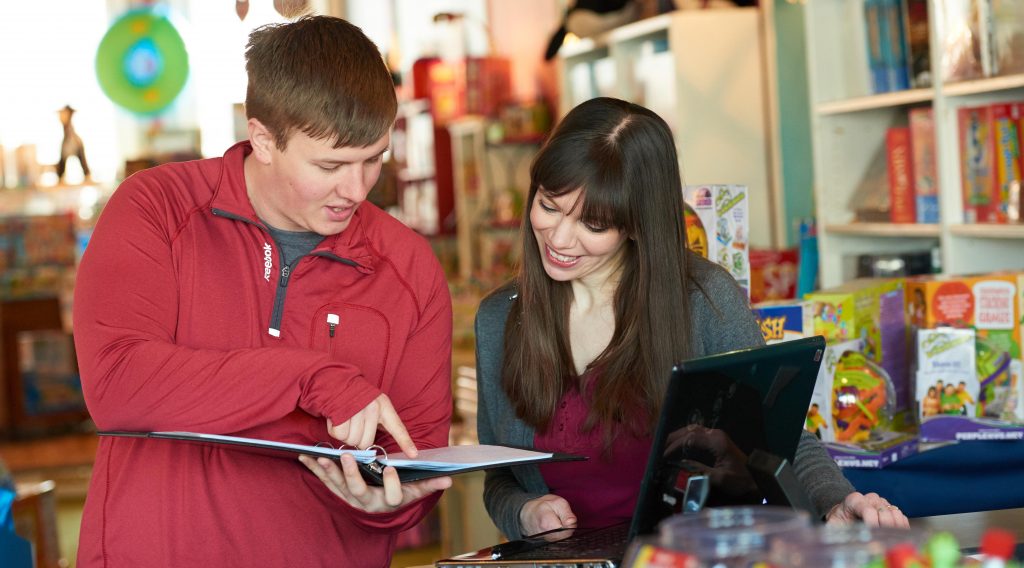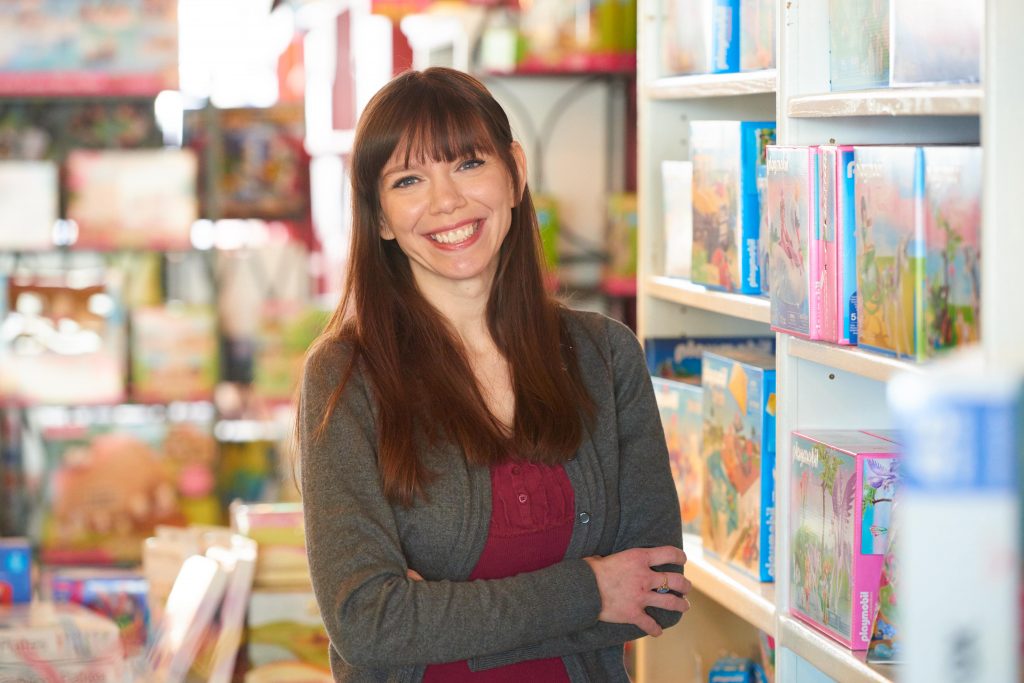
Erin Wolfe, right, opened The Toy Shop in downtown La Crosse in July 2015 with her husband, Adam. Here she meets with UW-La Crosse student Matt Hemmersbach, who helped create a marketing plan for her business as part of a class project. UWL’s Small Business Development Center helped link the two.
Erin and Adam Wolfe opened a toy store in downtown La Crosse because as parents of six kids, they know a lot about toys.
But with no prior business experience, the two were jumping into the retail world a bit blind, admits Erin.
“We thought it would be great to have some outside input and professional expertise to shine a light on a lot of things that were a mystery to us,” she explains.
That light came from UW-La Crosse’s Small Business Development Center, which offered the Wolfe’s free financial advice, business networking and connection to a UW-La Crosse (UWL) marketing class that helped them find the best ways to reach their target market.
“They were able to pull in a lot of statistics — things we couldn’t gather on our own because we couldn’t get access or didn’t have the time,” says Wolfe. “The amount of time they put into researching these things for us really helped.”
UWL senior and finance major Matt Hemmersbach says the experience helped him too. He landed an accounting internship at the La Farge-based company Organic Valley right after finishing his Marketing 309 class with The Toy Shop as his client.
“This boosted my resume at the perfect time,” he says.
In the interview, Hemmersbach says he was able to talk about the large amount of teamwork involved in the project and what it’s like to work with a real business owner. “I could tell they were impressed by that,” he adds.
Barb Larsen, associate lecturer in Marketing who teaches the class, worked in corporate marketing for 25 years prior to working in academia. She knew the great value and learning opportunity students would have by working with real businesses.
“I feel this is true learning — having to make personal contacts with real-live business people, doing actual research for a mission and the experience of developing marketing ideas that the clients can actually use in their businesses,” she says.

Downtown La Crosse Business Owner Erin Wolfe attributes store success to help she received from UWL’s Small Business Development Center and UWL College of Business Administration students who provided ideas on how to more efficiently use advertising dollars. “We are so wrapped up in running our business, sometimes we can’t see the bigger picture,” says Wolfe.
Larsen is involved in the La Crosse Area Chamber of Commerce and several other community organizations where she’s met many business owners who struggle to market themselves successfully. That, too, was inspiration for the project, she says.
Among other suggestions, the students gave The Toy Shop owners ideas on how to more efficiently use their advertising dollars and analyze whether those dollars were well spent.
“We are so wrapped up in running our business, sometimes we can’t see the bigger picture,” says Wolfe. “Having all these students look at it from the outside gave us a better perspective. Now we are seriously taking their advice for advertising dollars so we don’t make the same mistakes we were ignorant about before.”
Hemmersbach says he learned how to work with a team, research data to support advice, and ultimately summarize a 50-page marketing research paper into a 15-minute presentation for an audience of business owners.
Hemmersbach says working with a real-world client was much different than a typical marketing class project.
“I cared more about the work I was doing because I knew it would actually affect two great people trying to build a small business, which can be difficult when you’re competing against a Walmart or Target,” he says. “We really wanted to see them succeed. That helps you reach goals that you didn’t know you could.”
